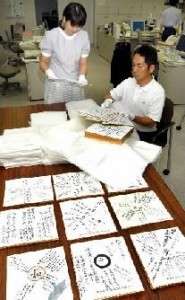Conveying the A-bomb Experience, Part 8
Jul. 5, 2010
Leaving "a word" in hopes of prompting others to reflect on the atomic bombing
by Kunihiko Sakurai, Masaki Kadowaki, and Takahiro Yamase, Staff Writers
The heat of the atomic fire, the agony of burned bodies, the grief wrought by families torn apart, the rage felt toward war… What should be done to etch the experiences borne of that day in our minds and in our memories, for generations to come, as the A-bomb survivors (hibakusha) and the family members of the A-bomb victims age? In this series (originally published in July and August 2004), the Chugoku Shimbun will consider the significance and challenges of conveying the A-bomb experience, with a focus on new efforts taking place in the A-bombed city of Hiroshima.
"I managed to endure the suffering, sometimes by swallowing down bitter persimmon juice." "I'm thankful that I was able to survive." The hands that held the pens to write these words may have been shaking. On thick, square paper boards, the handwriting is thin and unsteady.
Two years ago, the Hiroshima Prefectural Confederation of A-bomb Sufferers Organizations, chaired by Sunao Tsuboi, called on its membership of about 18,000 A-bomb survivors in Hiroshima Prefecture to leave "a word" in their own hand. Until that point, the confederation had proposed that hibakusha write a recounting of their A-bomb experiences and personal histories. But many have not, saying they lack the ability to write at length. So the confederation appealed to the hibakusha: "Just a word will do. Let us leave evidence for the next generation that we have suffered at the hands of the atomic bombing, but we nevertheless struggled to live with all our might."
Tomoe Maruyama of Koda Town, in the city of Akitakata, is hale and hearty at the age of 90. She can even still drive. As soon as she learned about the call of the Hiroshima Prefectural Confederation of A-bomb Sufferers Organizations through the Koda Town Association of Atomic Bomb Sufferers, she went out on foot, visiting the houses of 11 hibakusha in her neighborhood with a paper board in her hand. When she urged them to write something, saying, "These words will be read by our children's and grandchildren's generations," they all took up a pen right away.
On the day of the atomic bombing, Ms. Maruyama was on the fourth floor of the Hiroshima Communications Bureau (now, the Chugoku Postal Administration Office) in Motomachi, (now, Naka Ward), just over one kilometer from the hypocenter. The surrounding areas were burned to the ground and bodies floated in the rivers. She cannot forget the devastation. She also suffered from hair loss and a bloody discharge from her rectum. "I pray that Japan will adhere to the three non-nuclear principles" was the message she wrote in 13 Japanese characters on a paper board, moved by the conviction that human beings must never repeat the atomic bombings.
The Koda Town Association published collections of writing by hibakusha, titled "Goka no Ato" ("Scars of the Hell Fire"), in 1985 and 1997. However, the number of writers for the two collections combined totaled only 125. At this time, due to the diligent efforts of Ms. Maruyama and others, "a word" was collected from all 435 members. The number of paper boards reached 39.
Yaoso Yorikane, 73, chair of the association, looked back on that occasion and said, "I wanted to leave the wishes of all our members together." Mr. Yorikane added, "We should not let the A-bomb experience be forgotten. We have to think about our next steps now." He has been mulling further action in order to hand down the A-bomb experience, but the right idea has not arisen.
"As our physical strength is declining, it's now our last chance to do something," sighed Hiroshi Ikejiri, 79, chair of the Fukuyama city Association of Atomic Bomb Sufferers. In Fukuyama, too, "a word" was collected from about 750 people, or 90 percent of the members of the association. "I cannot describe the cruelty in so few words. But I hope our messages will prompt future generations to think about those days," Mr. Ikejiri said.
In 2006, the Fukuyama City Association will observe its 50th anniversary. The association plans to print the messages, using photocopies of the paper boards, for a publication that will be issued to mark the anniversary.
Over a little more than a year, the Hiroshima Prefectural Confederation of A-bomb Sufferers Organizations has gathered such messages from about 10,000 people in Hiroshima Prefecture. The paper boards include thoughts like "I will hang on for their sacrifice, as long as I live" and "May laughter resound throughout the world." The confederation has commissioned the Hiroshima National Peace Memorial Hall for the Atomic Bomb Victims in downtown Hiroshima to preserve the 579 square paper boards filled with resolutions and wishes for peace.
The Koda Town Association now has about 400 members. Compared to just two years ago, when the messages were written, more than 30 hibakusha have passed away. The messages recorded on the paper boards have unexpectedly turned out to be their "last will and testament."
(Originally published on July 29, 2004)








